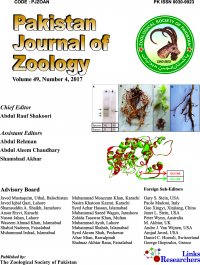Effect of SSAT on the Proliferation and Apoptosis of Prostate Cancer Cells via Regulation of Akt, GSK-3β and β-catenin Expression
Effect of SSAT on the Proliferation and Apoptosis of Prostate Cancer Cells via Regulation of Akt, GSK-3β and β-catenin Expression
Xian Zhang1, Erjiang Lin1, Shizhe Hong1 and Zhengjie Zhu2*
ABSTRACT
To investigate the effect of spermidine/spermine-N(1)-acetyltransferase (SSAT) on the proliferation and apoptosis of prostate cancer LNCaP cells under hypoxic conditions. Prostate cancer LNCaP cells were transfected with the eukaryotic expression plasmid pcDNA3.1 (D)/V5-His-SSAT, and cultured at 1% oxygen concentration. Western blotting was used to detect expression of SSAT, Akt, GSK-3β and β-catenin proteins; and flow cytometry was used to detect cell apoptosis rate and mortality rate. SSAT was successfully transferred into prostate cancer LNCaP cells. Compared to the blank cell group and the blank vector group, the expression of Akt, GSK-3β and β-catenin proteins in the SSAT transfection group was significantly down-regulated (P <0.05), the cell proliferation was significantly inhibited (P <0.05), and both apoptosis rate and mortality rate increased (P <0.05).Transfection of SSAT can reduce the proliferation and increase the apoptosis and necrosis rate of prostate cancer LNCaP cells by inhibiting the expression of Akt, GSK-3β and β-catenin proteins.
To share on other social networks, click on any share button. What are these?










